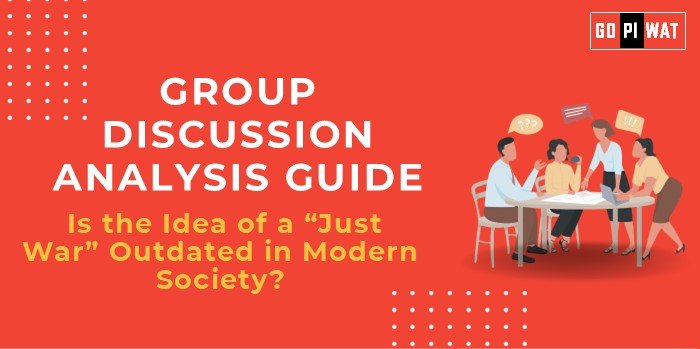📋 Group Discussion Analysis Guide: Is the Idea of a “Just War” Outdated in Modern Society?
🌐 Introduction to the Topic
Opening Context: Wars have shaped human history, often justified by principles of justice and morality. The concept of a “just war,” rooted in philosophical and theological traditions, examines whether wars can be morally justified. In an era of advanced weaponry, global interconnectivity, and the rise of non-state actors, the relevance of this concept invites debate.
Topic Background: The idea of a “just war” originates from early Christian theologians like St. Augustine and St. Thomas Aquinas, emphasizing conditions under which war is morally permissible. Over time, it has influenced international law, including the Geneva Conventions. However, contemporary challenges, such as cyber warfare, terrorism, and the humanitarian cost of modern conflicts, question its applicability today.
📊 Quick Facts and Key Statistics
- 💰 Global Military Spending: $2.2 trillion (2023) – Indicates the scale of preparation for potential conflicts.
- ⚔️ Conflict Death Toll: Over 100,000 people annually – Highlights the human cost of war.
- 💻 Cybersecurity Threats: Estimated $10.5 trillion in cybercrime damages by 2025 – Reflects the shift toward non-traditional warfare.
- 🌍 UN Peacekeeping Missions: 13 active operations worldwide (2024) – Demonstrates efforts to maintain global peace.
👥 Stakeholders and Their Roles
- 🏛️ Governments: Formulate defense policies and justify wars on moral or strategic grounds.
- 🌐 International Organizations (e.g., UN, ICC): Advocate for peace and accountability for war crimes.
- 🎖️ Military Forces: Implement strategies based on governmental directives.
- ⚔️ Non-State Actors: Wield significant influence through terrorism or insurgency.
- 👥 Civilians: Bear the brunt of war through displacement, loss, and trauma.
🏆 Achievements and Challenges
✨ Achievements:
- 📜 International Law Development: The Geneva Conventions and ICC provide frameworks to address wartime conduct.
- 🤝 Peace Treaties: Notable successes include the Camp David Accords and the Good Friday Agreement.
- 🌍 Humanitarian Interventions: Successful missions, such as NATO in Kosovo, demonstrate “just war” principles.
⚠️ Challenges:
- 🤷 Moral Ambiguities: Modern conflicts often lack clear aggressors and defenders, e.g., in Syria.
- 🤖 Technological Advancements: Drones and AI complicate ethical considerations.
- 🌎 Global Comparisons: Nations like the US have justified wars (e.g., Iraq 2003) under the “just war” doctrine, often facing criticism for ulterior motives.
💬 Structured Arguments for Discussion
- ✔️ Supporting Stance: “The principles of a just war remain crucial to regulating conduct in conflicts and preserving human rights.”
- ❌ Opposing Stance: “Modern warfare’s complexities render the traditional just war framework obsolete and insufficient.”
- ⚖️ Balanced Perspective: “While the idea of a just war provides moral guidance, it requires modernization to address contemporary conflicts.”
🛠️ Effective Discussion Approaches
- 🎯 Opening Approaches:
- 📖 “From World War II to Iraq, the idea of a just war has evolved, but its essence remains under scrutiny.”
- 📊 “With $2.2 trillion spent annually on defense, the moral justification for wars is a critical debate.”
- 🔄 Counter-Argument Handling: Acknowledge historical successes while proposing updates to just war criteria for modern relevance.
🔍 Strategic Analysis of Strengths and Weaknesses
- 💪 Strengths:
- Moral Framework: Helps justify necessary interventions.
- Legal Basis: Guides international policies.
- ⚡ Weaknesses:
- Outdated Criteria: Fails to address cyber and asymmetrical warfare.
- Manipulation Risk: Can be exploited for political agendas.
- 🌟 Opportunities:
- Framework Revision: Adapt to new challenges like terrorism.
- Global Cooperation: Strengthen international consensus.
- ⚔️ Threats:
- Escalation Risk: Misinterpretation can justify aggression.
- Public Distrust: Skepticism about war motives.
📚 Connecting with B-School Applications
- 🌍 Real-World Applications: Analyze leadership decisions in global crises, align ethical considerations with policy development.
- ❓ Sample Interview Questions:
- “Is morality still relevant in global military strategies?”
- “How can international organizations improve conflict resolution?”
- 💡 Insights for Students:
- Study decision-making frameworks in crisis situations.
- Explore the economic impacts of warfare and peacekeeping.


